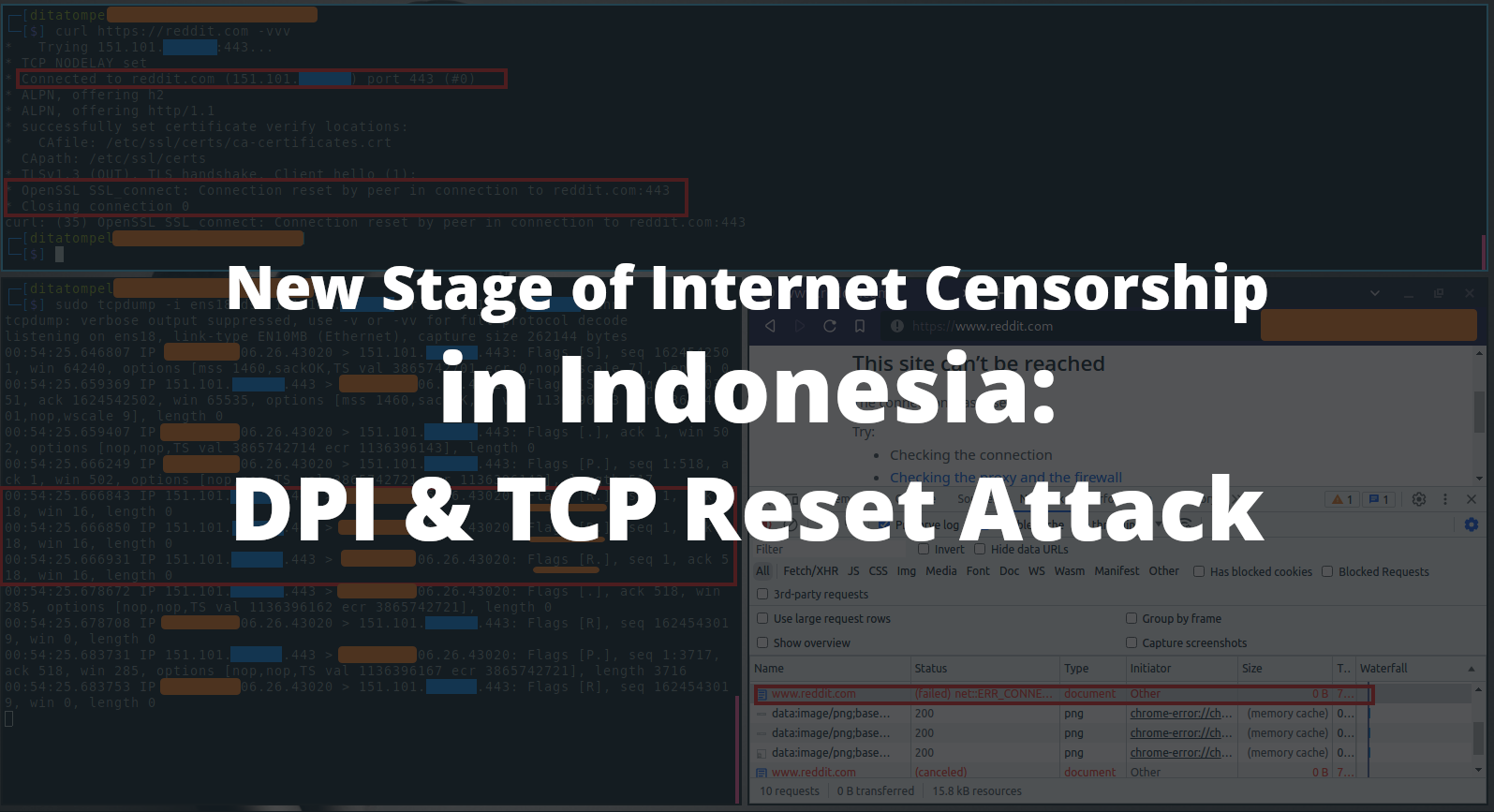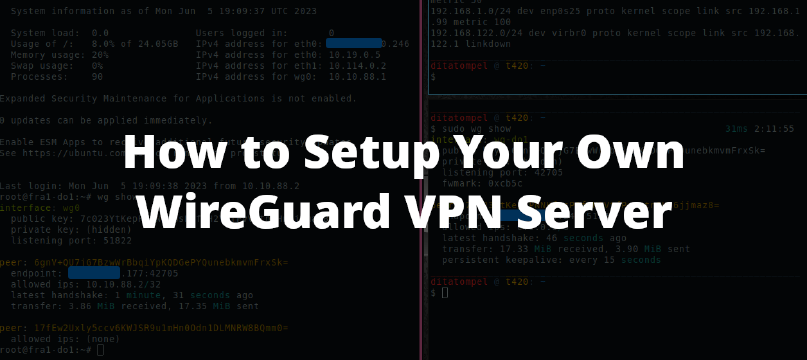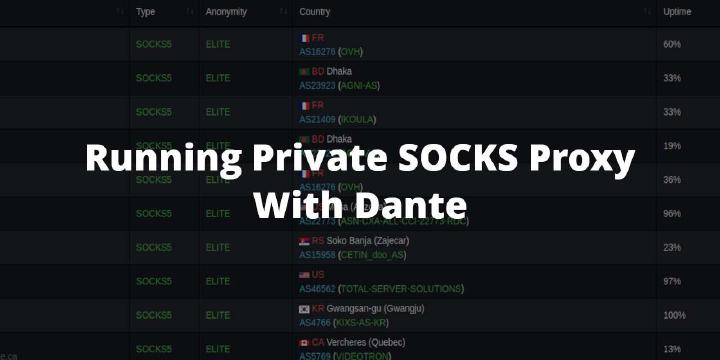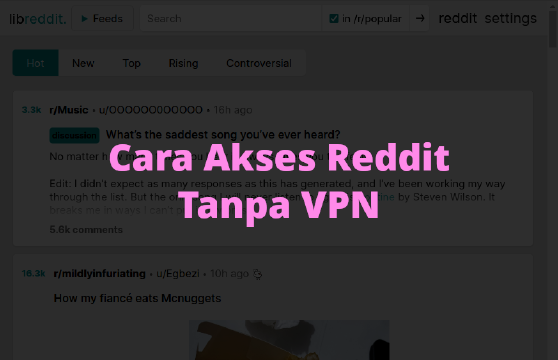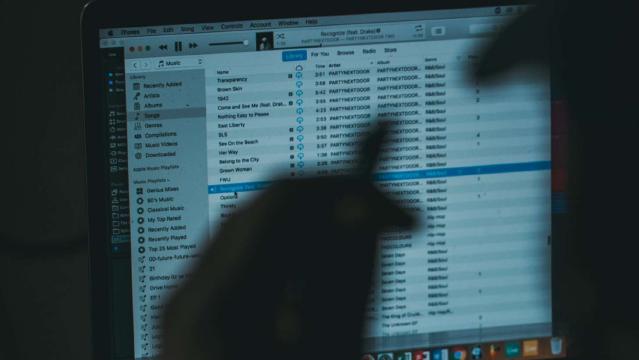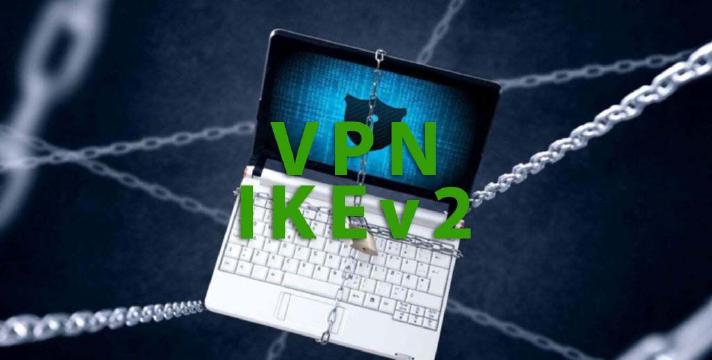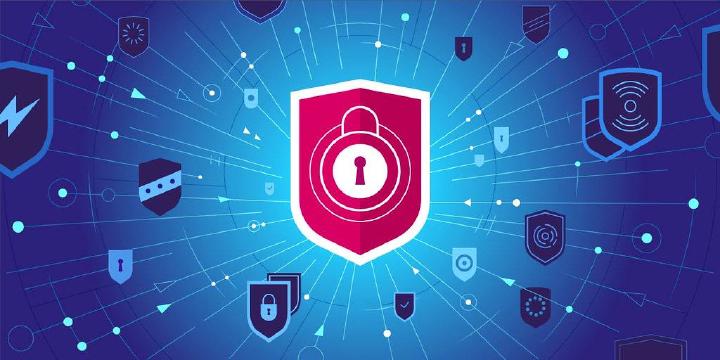Unlike before that using DNS filtering, several upstreams have performed a TCP Reset Attack to block access to websites that are considered illegal. And why you (especially Indonesian) should care for this mess.
Background
A few months ago, I started facing problems when trying to access reddit.com from my home connection, even though all devices in my home network already use DNS-over-HTTPS (DoH). The same thing happened even I route all my traffic to my server located in Indonesia Data Center using VPN tunnel.
My browser always shows “The connection was reset” error message when I try to access reddit.com. My libreddit service that I provided to access Reddit without NSFW contents stopped working (Previous server location: Indonesia Data Center Duren Tiga or IDC-3D).
After discussing with colleagues and make some observations, I’m sure that I’ve become a victim of TCP reset attack (TCP RST) and it happened at the upstream provider / network checkpoint that I used. It seems (in my personal opinion), my upstream provider is “forced” to carry out this “evil” activity.
Why do I say “forced”? Because most upstream providers are typically business oriented, and one of their business goals is to get the maximum profit. Meanwhile, doing Deep Packet Inspection (DPI) for large amount of traffic is not cheap. Just search for the price of Palo Alto 5200 series, Cisco Firepower 9300 series, or FortiGate 6000 series if you did not believe in me. That’s just hardware costs, not for maintenance costs, and operational expenses such as training, salaries, and others.
I’m aware that enterprise firewall devices like the ones I mentioned above must be owned by large ISP companies, especially at network checkpoints. But I’m sure, business people will prefer to save resources and avoid complaints from their customers (downstream) rather than to deploy and integrate DPI in their network infrastructure they already run.
If the cost of doing DPI will be very expensive, is it possible that the TCP-RST attack is implemented at every checkpoint on a national scale? It is just impossible, right? Hold my beer, read how “rich” our country is to buy and implement such things in #Privacy section.
Investigation
I did a very simple investigation to prove whether it was true that TCP-RST attack was automatically performed. There are 2 things that I do:
- Simply use my browsers inspect element feature (simple).
- Directly check from my server in Indonesia and do network capture using
tcpdump(advanced).
NOTE: From what I have observed, TCP-RST attack has not been implemented in all checkpoint / upstream. So there are still many providers who have not been affected.
Using browser’s inspect element feature (simple)
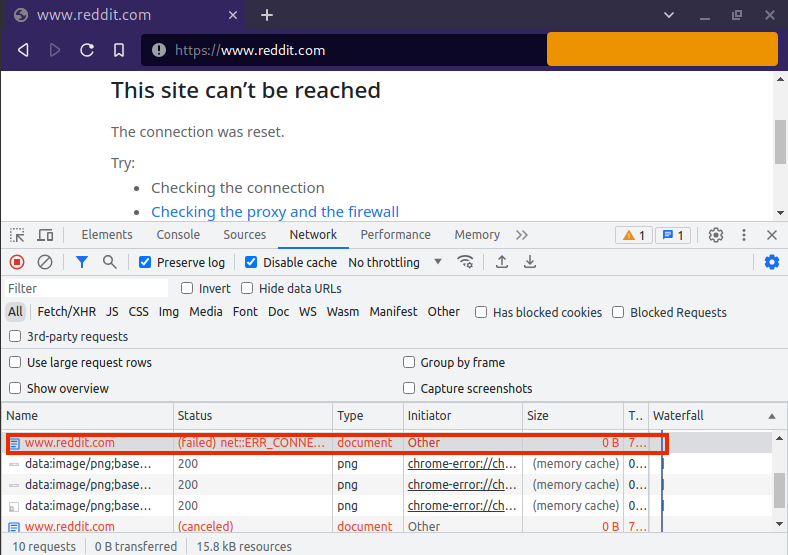
The easiest (but less detail) way is to use your browser. When you can’t access reddit.com (or any other government-blocked site) and get “The connection was reset” error message; most likely your ISP (or upstream ISP) already implemented this method.
In a more detailed way, before trying to access reddit.com, right-click on your browser and look for something like “inspect” or “developer tools”. Go to the “Network” tab and try to access reddit.com. The “CONNECTION_RESET” information message in the status column appears when the server sends packet reset (RST).
Using tcpdump and curl (advanced)
In order to understand this method, you need to know basic concepts of TCP/IP and 3-Way-Handshake.
I tried to do a direct investigation from my server which is at Indonesia
Data Center Duren Tiga. The method is quite simple, by sending HTTP GET
using curl to reddit.com and do packet capture using tcpdump simultaneously.
Below, 151.101.xx.xxx is one of the reddit.com IPs that I got from DNS
resolver when doing testing, and xxx.xxx.x06.26 is my server public IP.
Sample curl https://reddit.com -vvv output:
1* Trying 151.101.xx.xxx:443...
2* TCP_NODELAY set
3* Connected to reddit.com (151.101.xx.xxx) port 443 (#0)
4* ALPN, offering h2
5* ALPN, offering http/1.1
6* successfully set certificate verify locations:
7* CAfile: /etc/ssl/certs/ca-certificates.crt
8 CApath: /etc/ssl/certs
9* TLSv1.3 (OUT), TLS handshake, Client hello (1):
10* OpenSSL SSL_connect: Connection reset by peer in connection to reddit.com:443
11* Closing connection 0
12curl: (35) OpenSSL SSL_connect: Connection reset by peer in connection to reddit.com:443
sample tcpdump -i ens18 dst 151.101.xx.xxx or src 151.101.xx.xxx -Nnn output:
1tcpdump: verbose output suppressed, use -v or -vv for full protocol decode
2listening on ens18, link-type EN10MB (Ethernet), capture size 262144 bytes
300:54:25.646807 IP xxx.xxx.x06.26.43020 > 151.101.xx.xxx.443: Flags [S], seq 1624542501, win 64240, options [mss 1460,sackOK,TS val 3865742701 ecr 0,nop,wscale 7], length 0
400:54:25.659369 IP 151.101.xx.xxx.443 > xxx.xxx.x06.26.43020: Flags [S.], seq 2720903651, ack 1624542502, win 65535, options [mss 1460,sackOK,TS val 1136396143 ecr 3865742701,nop,wscale 9], length 0
500:54:25.659407 IP xxx.xxx.x06.26.43020 > 151.101.xx.xxx.443: Flags [.], ack 1, win 502, options [nop,nop,TS val 3865742714 ecr 1136396143], length 0
600:54:25.666249 IP xxx.xxx.x06.26.43020 > 151.101.xx.xxx.443: Flags [P.], seq 1:518, ack 1, win 502, options [nop,nop,TS val 3865742721 ecr 1136396143], length 517
700:54:25.666843 IP 151.101.xx.xxx.443 > xxx.xxx.x06.26.43020: Flags [R.], seq 1, ack 518, win 16, length 0
800:54:25.666850 IP 151.101.xx.xxx.443 > xxx.xxx.x06.26.43020: Flags [R.], seq 1, ack 518, win 16, length 0
900:54:25.666931 IP 151.101.xx.xxx.443 > xxx.xxx.x06.26.43020: Flags [R.], seq 1, ack 518, win 16, length 0
1000:54:25.678672 IP 151.101.xx.xxx.443 > xxx.xxx.x06.26.43020: Flags [.], ack 518, win 285, options [nop,nop,TS val 1136396162 ecr 3865742721], length 0
1100:54:25.678708 IP xxx.xxx.x06.26.43020 > 151.101.xx.xxx.443: Flags [R], seq 1624543019, win 0, length 0
1200:54:25.683731 IP 151.101.xx.xxx.443 > xxx.xxx.x06.26.43020: Flags [P.], seq 1:3717, ack 518, win 285, options [nop,nop,TS val 1136396167 ecr 3865742721], length 3716
1300:54:25.683753 IP xxx.xxx.x06.26.43020 > 151.101.xx.xxx.443: Flags [R], seq 1624543019, win 0, length 0
Note from the tcpdump flag result above:
| TCP Flag | tcpdump flag | Description |
|---|---|---|
SYN | S | Connection start |
FIN | F | Connection end |
RST | R | Connection reset |
PUSH | P | Data push |
ACK | . | Acknowledgment |
* Flag may be combined, for example
[s.]isSYN-ACKpacket.
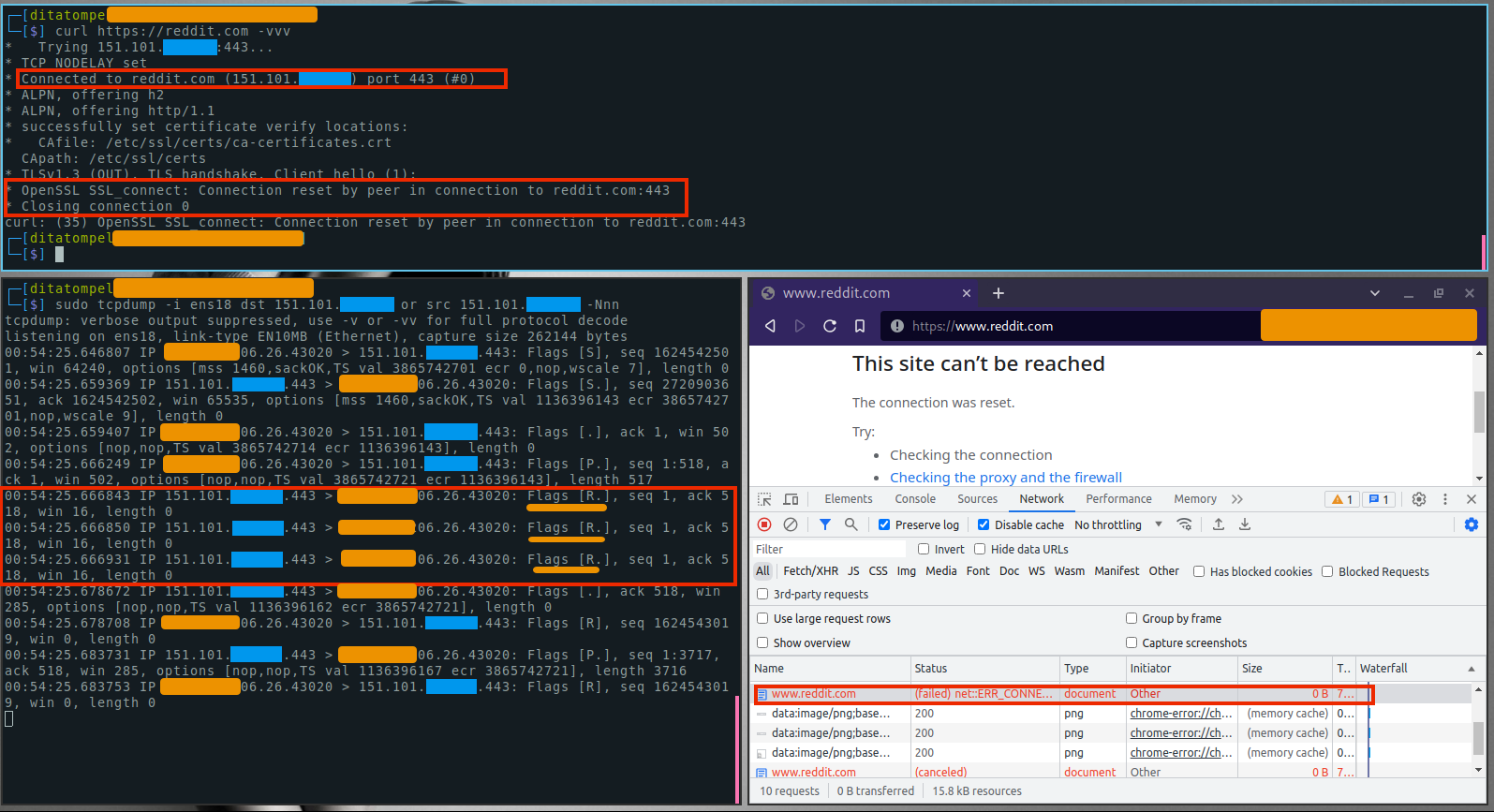
It is clear that after handshakes and first data packet was sent from my
server, I immediately receive a RST (reset) flag.
Why you should care?
Even though it is not (yet) in the same class as The Great Firewall of China (GFW), the indications going to be there are very high. The previous method were just DNS spoofing, DNS Filtering and DNS Redirect; but now using Deep Packet Inspection and TCP reset attack which impossible for majority non-tech people in Indonesia to bypass.
Quoted from Wikipedia, the Indonesian government through Telkom Indonesia (government-owned ISP) supported by Cisco Meraki DPI technology perform country-wide surveillance by the way of Deep Packet Inspection and map National Identity Number (NIK) of its citizens that registered to the state-owned ISP.
The purpose of Deep Packet Inspection (DPI) includes filtering pornographic content, hate speech and reducing tension (for example in Papua 2019). Indonesian government also plans to scale up the surveillance to the next level until 2030.
Increasingly limited access to information
In the future, obtaining information that is considered “forbidden” by the government will be very difficult. Want to see and try the real examples by yourself? Try using a search engine from China called Baidu and do a search with “Tiananmen Square” keyword. Compare search results from Baidu with other search engines results.
I’ve experienced it myself, although it’s not like and as bad as in China, but it’s very inconvenient and annoying. For example, when I try to search something related to IT problems, Reddit discussion usually appears on search engine results, the solution was there (or at least, link to the solution was there). But to access it, I have to route all my laptop internet traffic to my VPN server (outside Indonesia) first before entering the reddit link page of the search results.
Damage to human rights and democratic values
Restrictions on digital rights can undermine human rights and reduce democratic values. For example, at the beginning of 2021, residents of desa Wadas who had rejected the Andesite stone mining project (for the purposes of the Bendungan Bener project). Over the next few months, residents of desa Wadas are still launched a series of protests and using social media as online mobilization tools and raise awareness. However, their internet connectivity was (believed to be) restricted by the authorities in response to citizen protests in February 2022.
Wadas protesters reported difficulty accessing their Twitter accounts that same week, though it remains unclear how authorities limiting their access to their own Twitter accounts. Read more complete article from DetikX: “Derasnya Penindasan Hak Digital di Wadas” written in Bahasa Indonesia.
Chilling Effect and the death of freedom of expression
Chilling Effect is a concept of public fear that arises due to ambiguous laws or regulations (EHEMMMMM… UUITE. Ehemmmm… Sorry for coughing suddenly). In Indonesia chilling effect usually is related defamation or hate speech (Ehemmm… sorry cough again…).
During 2018, police arrested 122 people for hate speech on social media (written in Bahasa Indonesia). There are five types of crimes, ranging from hoaxes, fake news, blasphemy, to defamation said Brigjen Pol. Rachmad Wibowo who at that time served as Direktur Tindak Pidana Siber Badan Reserse Kriminal Polri (Director of cyber crime at the Indonesian National Police’s criminal investigation agency).
Then in 2021, the “activation” of Indonesia Cyber Police drive civils to increasingly practice self-censorship, especially regarding freedom of speech. That statement was conveyed by the Coordinator of Komisi untuk Orang Hilang dan Tindak Kekerasan (Kontras, the Commission for Missing Persons and Acts of Violence), Fatia Maulidiyanti.
And in February 2022, the survey results from Indikator Politik Indonesia showed that 62.9% (using the stratified random method out of 1,200 respondents with a margin of error of around 2.9%) respondents agreed and strongly agreed that the public is now increasingly afraid of expressing opinions (written in Bahasa Indonesia).
“If (for example) you get terrible (fake) news, then report it to the police, in a few minutes it will be known from whom, where from, then the culprit is found and then arrested.” — Mahfud MD
Privacy
Actually, Deep Packet Inspection was initially created to measure and
manage network security and protect users and prevent the spread of malware.
However, using this technology as a surveillance tool will have a very bad
impact on your our privacy. In addition, DPI can also be used to study the
behavior or interest of an individual or institution from their activities on
the internet which can be used for targeted (behavioral) marketing.
Various reports have linked authorities with the purchase and use of spyware and other sophisticated surveillance tools. For example, in 2015, Citizen Lab; a research group based in Toronto alleges that the Indonesian government use FinFisher spyware which collects data such as Skype audio, key log, and screenshots.
In 2016, Joseph Cox revealed that International Mobile Subscriber Identity-catchers (IMSI-catchers) was sold to Indonesia from Switzerland and British companies. IMSI-catcher is a device used to intercept traffic of cellphone networks and track the location of cellphone users. You could say, it’s like a “fake BTS” as an intermediary between the user’s cellphone and the ISP’s original BTS.
In December 2021, Citizen Lab, stated that there was a high probability that the Indonesian government had become a Cytrox (selling Predator Spyware) customer. In addition, Citizen Lab also reported in December 2020 that Indonesia is very likely to have purchased technology from Circles, a company that sells exploits of global cellular systems who later joined the NSO group. The method used by Citizen Lab to find out their report is by doing scanning & signature fingerprinting of firewall checkpoint on Circles devices through Shodan service.
Economic impact
So far (from what I have observed), TCP-RST attack implementations still only exist in several upstream providers / checkpoints. However, if this continues to be carried out and implemented in all checkpoints that leaving Indonesia (outbound traffic), then it will definitely have an impact on buying interest for Cloud Provider / Datacenter located in Indonesia.
Who wants their microservices suddenly stopped working because of this TCP-RST attack? I started moving my VPSes somewhere outside Indonesia, because in my opinion, server / cloud infrastructures should not be (suddenly) restricted (without prior notification) to access public data or APIs.
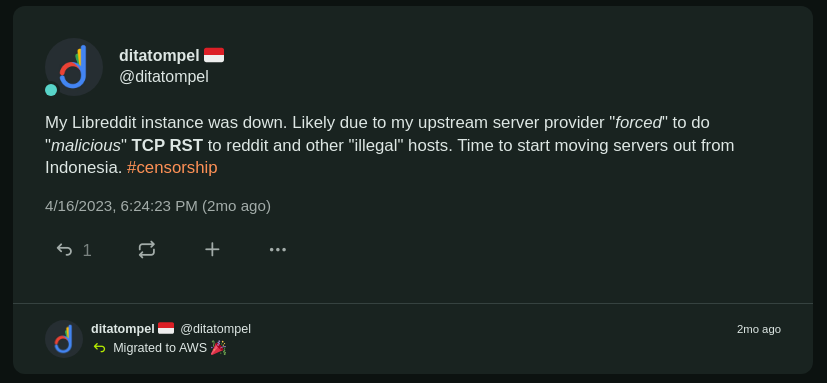
Evading censorship
To bypass DNS based censorship such as DNS spoofing, DNS filtering and DNS redirect; teaching non-tech people to use DNS-over-HTTPS (DoH) is quite easy. But to bypass DPI and TCP RST attack would be very difficult and impossible for majority non-tech people in Indonesia to do.
A few way to avoid censorship is use network tunnel to a server outside Indonesia, whether it’s VPN or SOCKS5 proxy. Even then, the government and the ISP you use will still know that you are using a Proxy / VPN. The difference is: they only know that you are connecting to VPN / SOCKS5 servers and where the VPN / SOCKS5 server is located. Other than that, they don’t know anything (only you and VPN / Server / Proxy provider know what service / host you communicate with).
If you are really concern about privacy, choosing a VPN provider must also be done with quite complicated research. Lots of apps on the App Store offer free VPN, but most of them end up with selling your data.
And I hope, QUIC/HTTP3 technology will enter a new chapter soon that “may” help us mitigate the impact of TCP RST attack a bit.
Sources and references
- “Indonesia: Freedom on the Net 2022 Country Report” - freedomhouse.org.
- “State of Privacy Indonesia” - privacyinternational.org.
- NetBlocks. 2019b: “Internet disrupted in Papua, Indonesia amid protests and calls for independence” - netblocks.org.
- Thompson, Nik; McGill, Tanya; and Vero Khristianto, Daniel, “Public Acceptance of Internet Censorship in Indonesia” (2021). ACIS 2021 Proceedings. 22.
- Wildana, F. (2021) “An Explorative Study on Social Media Blocking in Indonesia”, The Journal of Society and Media, 5(2), pp. 456–484. doi: 10.26740/jsm.v5n2.p456-484.
- Paterson, Thomas (4 May 2019). “Indonesian cyberspace expansion: a double-edged sword”. Journal of Cyber Policy. 4 (2): 216–234. doi:10.1080/23738871.2019.1627476. ISSN 2373-8871. S2CID 197825581.
- Bill Marczak, John Scott-Railton, Bahr Abdul Razzak, Noura Al-Jizawi, Siena Anstis, Kristin Berdan, and Ron Deibert, “Pegasus vs. Predator: Dissident’s Doubly-Infected iPhone Reveals Cytrox Mercenary Spyware” - citizenlab.ca.
- Bill Marczak, John Scott-Railton, Siddharth Prakash Rao, Siena Anstis, and Ron Deibert, “Running in Circles Uncovering the Clients of Cyberespionage Firm Circles” - citizenlab.ca.
- Bill Marczak, John Scott-Railton, Adam Senft, Irene Poetranto, and Sarah McKune, “Pay No Attention to the Server Behind the Proxy”, Mapping FinFisher’s Continuing Proliferation - citizenlab.ca.
- Joseph Cox, “British Companies Are Selling Advanced Spy Tech to Authoritarian Regimes” - vice.com.
- Thomas Brewster, “A Multimillionaire Surveillance Dealer Steps Out Of The Shadows and His $9 Million WhatsApp Hacking Van” - forbes.com.
- Moh. Khory Alfarizi, Febriyan, “Survei Indikator Politik Indonesia: 62,9 Persen Rakyat Semakin Takut Berpendapat” - tempo.co.
- Abba Gabrillin, Krisiandi, “Selama 2018, Polisi Tangkap 122 Orang Terkait Ujaran Kebencian di Medsos” - kompas.com.
- Tsarina Maharani, Dani Prabowo “Kontras: Polisi Siber yang Akan Diaktifkan Pemerintah Berpotensi Bungkam Kebebasan Berekspresi” - kompas.com.
